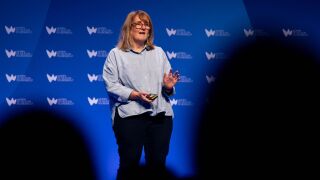Remote Scottish island boosts digital connectivity via satellites.
Tech Minister announced bold move in bid to cement the UK as an international leader in telecoms.
Papa Stour, located in the Shetland islands in Scotland is one of the most remote communities in the UK will see the introduction of high-speed broadband, powered by satellites.
Residents in Papa Stour, one of the UK’s most inaccessible communities will be connected to high-speed broadband, enabling residents to stay connected wherever they are.
The project was announced by the Minister at a speech at London Tech Week, as part of a package of initiatives which also include support for local authorities to procure and test ‘smart lampposts’, boosting connectivity within local communities. Sir John Whittingdale, said: “Our announcements today will help ensure that everyone, no matter where they live, has access to high-speed broadband and other digital services that they need to thrive in the 21st century.
“Improving Papa Stour’s connectivity is a major milestone in our efforts to close the digital divide as it transforms the lives of the island’s residents and visitors.
“Improving digital connectivity is a top priority for the government. Our mission is to deliver fast, reliable connectivity for everyone in the UK and to continue to be a global leader in telecoms, and today’s package shows exactly that.”
Hubert Da Costa, chief revenue officer at Celerway said, "News of the Government’s plan to increase connectivity represents a step in the right direction to cementing the UK as a world leader in the telecommunications space. The provisions ensure that consumers and businesses, even in remote and inaccessible areas, can access high speed broadband no matter their location, providing the ability to innovate and create new field capabilities as 5G coverage increases.
"In some cases, seamless connectivity could really be the difference between life or death. By seeking to improve the UK’s connectivity infrastructure, we are futureproofing the lifeblood of so many organisations and industries that continue to rely on connectivity to do their jobs."
Clarus Networks Group starts work on installing a specialist Kymeta flat panel today which, when finished later this week, will link to OneWeb’s constellation of low earth orbit (LEO) satellites to beam high-speed, reliable broadband connections to the island from space.
The panel’s installation marks its first commercial roll-out in Europe and forms part of the government’s Alpha Trial programme launched in December to test the capability and viability of low orbit satellites to deliver high-speed connectivity to communities in very hard to reach areas.
Broadband connectivity will be beamed down to the Scottish island’s rugged coastline via OneWeb’s satellite network, delivering life-changing digital accessibility, made possible by British-born science and technology innovation, and effective collaboration between central and local government.
Paul Coffey, CTO, The Clarus Networks Group, said, “At Clarus we harness the power of satellite connectivity, combined with state-of-the-art wireless technologies, to solve connection challenges. Until now, Papa Stour residents have been constrained due to unreliable and slow internet connectivity. We are excited to partner to bring lightning fast and reliable internet to the island for the first time. This installation is a landmark step in connecting remote communities, offering new possibilities for UK business and tourism.”
The initiative, a joint programme between DSIT and the Department for Transport (DfT), will provide up to £1.5 million in funding for 6 local authority-led pilots, which will be matched by smart service providers working with the participating local authorities, to procure and test innovative smart multi-purpose columns or lampposts.
Smart multi-purpose columns or lamp posts are street furniture that have the capacity to deliver a range of smart services, including improved mobile network connectivity, public wifi, electric vehicle charging, public safety and environmental monitoring. Investing in this technology can help bring cost savings to a local authority and increase connectivity for local communities.
Technology and Decarbonisation Minister Jesse Norman said, “By turning lamp posts and other road infrastructure into smart devices such as public wifi points, the government are investing in the ways everyday transport infrastructure can be transformed for a greener, cleaner future.”






